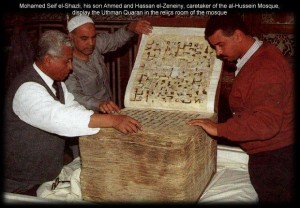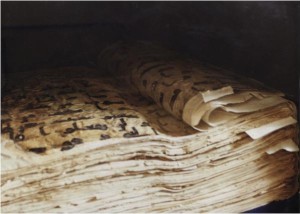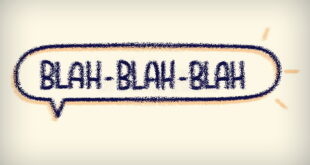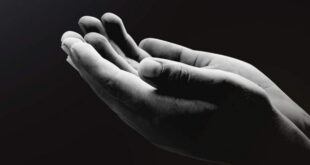Recording and Preservation of the Quran
The very first word revealed to Muhammad (pbuh) was ‘iqra’ meaning read or recite (Surah Al ‘Alaq 96:1). Thus it is not surprising that as soon as a verse was revealed, prophet Muhammad (pbuh) would memorize it so that he could recite it to others, and the very next Surah that was revealed was Surah Al Qalam 68 Ayah (1-2), which emphasised the use of pen, thus not only that the revealed verses were memorized, they were also put in writing.
“Nun. By the Pen and by the (Record) which (men) write.” (Surah Al Qalam 68:1)
“Thou art not by the grace of thy Lord mad or possessed.” (Surah Al Qalam 68:2)
Among the many companions of the Prophet, some of the most literate, who had good command of the Arabic language, were Abu-Bakr, Ali Ibn Abi-Talib, Uthman Ibn Afan, Zaid Ibn Thabit, Umar Ibn al-Khattab. There were many companions towards the end of this mission, some were more closer to the Prophet than others. They were all very pious and righteous people, full of integrity and honesty. They were ready to follow and support the Prophet at the expense of all their personal belongings and lives. In addition to acting as his scribes, they also memorized the Quran directly from Muhammad (pbuh).
As soon as a portion of the Quran was revealed, Muhammad (pbuh) would call his scribe, from among his companions, to record it in writing. The Prophet would than ask the scribe to read the portion to ensure that what was written down was verbatim word of Allah. Once satisfied with the written text, the Prophet would instruct the scribe to put the verse or verses where they belonged. That is, he would say the name of the Surah and the location where the just revealed portion (verse or verses) were to be inserted, thus ensuring that the textual order of the Quran was in accordance with the Divine plan.
His scribes used leather, parchments, leaves and tablets to write down the verses. These manuscripts were kept in the safe custody, and it is reported that in fact they were kept in the house of the Prophet.
It was quite common for many companions to also make their own personal copies with marginal notes, foot-notes and comments for their personal use. Thus the Quranic verses were not only memorized by the Prophet and many of his companions, but also existed in written form during the lifetime of the Prophet, unlike any other scriptures in the history of world religion.
In order to ensure the authenticity of the Quran, Allah Almighty took the necessary steps – once every year during the month of Ramadan, Angel Gabriel (Jibreel (alayhis salaam)) would come to the Prophet and hear him recite the Quran (whatever was revealed to that point in time). And during the last year, before Muhammad’s death, Angel Gabriel came twice to hear him recite the Quran, thus ensuring that the words of Allah have not been forgotten or changed. During this review many companions were present and heard the Prophet’s recital. Hence, they also had the chance to ensure that what they had memorized were correct and not forgotten.
We also know that the Prophet lead the five daily prayers, during which he would recite portions of the Quran. This also became an excellent means of ensuring that his followers would never forget what they had memorized.
Muhammad (pbuh) was the ‘Living Quran’. He helped his companions memorize the Quran and as time went by, many of those who embraced Islam, started memorizing as well. These memorizers of the Quran, known as Huffaz-Al-Quran. Thus, the Quran was in the memory of many Muslims and was also in written form during the lifetime of the Prophet. The proof that Quran was in written form during the lifetime of the Prophet is evident from the following Hadith:
Narrated Ibn Umar: “The messenger of Allah (pbuh) said: “Do not take the Quran on a journey with you, for I am afraid lest it should fall into the hands of the enemy.” (Sahih Bukhari, Vol. IV No. 233)
Another strong evidence that the revelations were in written form during the lifetime of the Prophet comes from his last sermon – The Prophet is reported to have said:
“I leave behind me two things, the Quran and my examples, the Sunnah and if you follow these you will never go astray…”
If the Quran was not in written form during the lifetime of the Prophet, he would never have said I leave behind the Quran.
Hence, unlike any other scripture, the Quranic revelations were recorded and written down during the lifetime of The Prophet (Muhammad, pbuh).
The First Official Volume of the Quran

Since Muhammad (pbuh) was the ‘Living Quran’ and many Muslims during his lifetime who had memorized the Quran were ‘Living Copies’ of the Quran, there was no need or urgency to put the manuscripts together to form the first official volume.However, after the death of the Prophet, more than seventy Huffaz (memorizers of the Quran) were martyred in the battle of Al-Yamamah. This caused a great deal of concern to Umar Ibn al-Khattab (one of the close companions of the Prophet), who was deeply concerned at this sudden loss of the Oral Copies of the Quran. He approached Abu Bakr, the first caliph, to start the process of gathering the manuscripts of the Quran under one official volume for reference and for the future. Abu Bakr, with some reluctance, appointed Zaid; another companion of the Prophet, with the task.
Zaid had memorized the Quran, was one of the main scribes and had heard the Prophet recite the Quran to Angel Gabriel during Ramadan. He was also a man of piety, integrity and honesty, as such had all the credentials needed to undertake such a supreme task.
Zaid, along with other trustworthy and competent colleagues, collected the manuscripts from many people and started to compile them in accordance with the Prophet’s original instructions. This was not done behind closed doors or in secret, it was in fact a public affair.
Even though he was an authority in the Quran, he took many steps to check, cross-check with other memorizers and with manuscripts from many other companions to guarantee that the final compiled version was authentic and that no alteration or modifications were made.
Just to illustrate how authentic the Quran is, this is one of the striking examples. Every Surah in the Quran begins with the usual formula of ‘Bismillah‘ (In the name of Allah). However, Surah nine is the only exception – it does not begin with the formula of ‘Bismillah‘. It is the natural tendency of all human beings to follow the most normal and common practice. Hence, Zaid and other companions of the Prophet would have been tempted to add ‘Bismillah‘ to make it consistent with all the other 113 Surah in the Quran, but they refrained from such alteration or addition.
Chronologically speaking the revelation of Surah eight and Surah nine are separated by an interval of seven years. Although the Prophet had directed that Surah nine should follow Surah eight, it was not clear whether the Ayat (verses) were to form a separate Surah or to form a part of Surah eight. As such, Zaid treated it as a separate Surah (Surah 9), but the ‘Bismillah‘ was not prefixed to it, as there was no warrant for supposing that the Prophet used the ‘Bismillah‘ before it in his recitation of the Quran.
This methodology proves how honest and truthful Zaid was in his compilation. The first official volume, prepared under the supervision of Zaid, of the Quran was in the custody of Abu Bakr, the first Caliph. Before his death, he passed this copy to Umar, the second Caliph who in turn passed it to Hafsa, one of the widows of the Prophet.
Copies of the Quran from the Original

During the time of Uthman (RA), the third Caliph, Islam spread fast and many companions moved out of Arabia. Amongst the many countries and provinces that accepted Islam were Syria and Iraq, but their language was not Arabic. One of Prophet’s companions, Huthaifah-ibn el-Yaman, during his visit to Syria and Iraq learnt that people were reciting the Quran in different modes or style. This disturbed him very much and upon his return, he requested Uthman to reproduce and distribute copies of the Quran that would help Muslims read or recite the Quran in a single consistent manner to avoid any conflict.Uthman appointed twelve members, headed by Zaid to write the Quran in the mode of the Quraish, the one used by the Prophet in his recitation.
Zaid along with the other companions, reproduced a number of copies based on the original volume produced during the time of Abu Bakr. The handwriting was to agree with the Arabic dialect of the Quraish. These copies maintained the order of the Surah and the Ayat (verses) within the Surah as laid down by the Prophet and memorized by the Quran bearer. Of the completed official copies Uthman ordered three to be sent to Syria, Iraq and Makkah respectively and one to be kept in Madinah. The original manuscript was returned to Hafsah.
Uthman then ordered that all the other Quranic materials whether written in fragmentary manuscripts or whole copies be burnt. This was a precautionary measure taken to prevent any future conflict in the mode of recitation or otherwise. Thus preventing the Quran from fabrication or corruption – This has been assured by Allah in the following verse:
“We have without doubt sent down the Message; and We will assuredly guard it (from corruption).” (Surah Al Hijr 15:9)
The Quran in our hands today
During the early years of Islam, which was mostly confined to Arabia, the use of diacritic or the vowels was not required because Arabs knew their language very well. However, as Islam spread to other parts of the world, the use of diacritical points as well as the vowels were necessary for the proper pronunciation.
For example the letter that sounds like Ba, Ta, Tha, Nun and Ya all looked alike. To the Arab reader there was no confusion, but to non-Arabs it was difficult, hence the use of dots and vowels were introduced by an eminent linguist, Abu-Asswad-ed-Doaly to convey the right sound.
Later copies of the Quran either in hand-written form or printed form made use of the ‘Tashkil‘ and ‘I’jam‘. Therefore apart from the addition of ‘Tashkil‘ and ‘I’jam‘, the Quran in our hands today is identical in contents (word for word, syllable to syllable) to the one revealed to Muhammad (pbuh).
It has been the desire of many unbelievers to prove discrepancies in the Quran. Numerous attempts have been made since its revelation to find discrepancies in it. The most extensive research was done in the last century in the Institute of Munich, University of Munich, Germany. Forty two thousand copies of the Quran including manuscripts and printed texts, produced in different parts of the world were collected. Research was carried for almost half a century and at the end, the researchers concluded that apart from copying mistakes, there was no discrepancy in the text of those forty two thousand copies; even though they were collected from different parts of the Globe and belonged to the period between the 1st century Hijra to the 14th century Hijra. (Ref. Internet, History Of Torah, Injeel and Quran).
Two copies of the original Quran from the time of Uthman (pbuh) still exist today, one is in Istanbul and the other in Tashkant. Whosoever is interested, may compare the text of the Quran today from any part of the world with these two original copies, he will not find any discrepancy. For a more detailed information please refer to the book called Ulum Al-Quran, by Ahmed Von Denffer.
The researchers only confirmed to the world what Allah had revealed in the Quran more than 1400 years ago:
“Do they not consider the Quran (with care)? Had it been from other than Allah they would surely have found therein much discrepancy.” (Surah Al ‘Nisa 4:82)
Allah has challenged both Man and Jinns (unseen creatures) to produce the like of the Quran and no one to this day has produced one like it:
“(Muhammad) Say: If the whole of mankind and Jinns were to gather together to produce the like of Quran, they could not produce the like thereof even if they backed up each other with help and support.” (Surah Al Isra’ 17:88)
Allah has also promised to protect it from any corruption or fabrication:
“We (Allah) have without doubt sent down the Message; We will assuredly guard it (from corruption).” (Surah Al Hijr 15:9)
“No falsehood can approach it from before or behind it: it (the Quran) is sent down by one (Allah) full of wisdom worthy of all praise.” (Surah Fussilat 41:42)
One orientalist like Menzes provides an excellent summary about the Quran as follows:
“The pious veneration with which the whole body of the Musulmans from the very first regarded his revelations as the word of God, the devotion with which they committed them to memory and their evidence that transcripts existed even from an early period of Muhammad’s ministry combined with the fact that Zaid’s collection came into immediate and unquestionable use, all leaves no doubt in the mind that the Quran contains the very words delivered to the Prophet. The few variations are confined almost entirely to the vowel forms and diacritical points which are inventions of later periods which were non existent in Zaid’s time.” (Reference, The Sublime Quran And Orientalism, by Muhammad Khalifa)
Quran is the only religious Book in the world that has been memorized by a great number of Muslims around the globe since the time of the Prophet, and has been carried down as a common practice throughout the world to this day. Those people who memorize the Quran are known as Huffaz-al Quran. They know the Quran word by word, syllable for syllable, hence if the world ever decided to obliterate the Quran from the face of this earth, the Huffaz will be able to reproduce the Quran in no time – thus making the Quran indestructible, imperishable.
Source : http://www.iad.org/
 navedz.com a muslim's Quest for the truth
navedz.com a muslim's Quest for the truth









I don’t think it hyperbole to describe the Qur’an itself as miraculous. Even ignoring the huffaz, that it remains unchanged after 14 centuries is extraordinary. That it remains relevant…is by design. Salaam!
“Among the many companions of the Prophet, some of the most literate, who had good command of the Arabic language, were Abu-Bakr, Ali Ibn Abi-Talib, Uthman Ibn Afan, Zaid Ibn Thabit, Umar Ibn al-Khattab.” Truer words were never uttered.
Assalmoalaykom.
Nowadays I read a book named “COME SEARCH WITH ME” written by SUBODH K PANDIT MD. Printed in the U.S.A, Published by XULON PRESS
In this book chapter 5,writer quot from Qur’an [11:13, 10:38] and writes HERE IS A STATED CHALLENGE. BUT WHEN I ATTEMPTED TO TEST IT OUT, THERE WERE FOUR SNAGS THAT KILLED THE ATTEMPT.
a. THE CHALLENGE DID NOT STATE WHAT FEATURE WAS TO BE EQUALED — WHETHER IT WAS THE PROSE OR POETRY OR RHYTHM OR DICTION OR PHILOSOPHY OR DOCTRINE OR BELIEFS OR DESCRIPTIONS OF GOD etc.
b. IT DID NOT DEFINE THE METHOD OF COMPARISON. HOW WOULD A DECISION BE MADE WHETHER THE QURAN WAS BETTER, EQUAL OR WORSE?
c. WHO WOULD BE THE FINAL JUDGE REGARDING THE COMPARISON ? WOULD IT BE AN IMAM, A MUSLIM COUNCIL, A NEUTRAL BODY, AN INTERNATIONAL COMMITTEE OR AN INDIVIDUAL LIKE ME ? BY DEFAULT, I FELT THAT I SHOULD BE THE JUDGE. IF SO, THEN I THINK THERE ARE OTHER WRITINGS THAT CAN EQUAL THE QURAN IN ONE OR MORE ASPECTS — OMAR KHAYYAM,RABINDRANATH TEGORE, JALLALUDDIN RUMI, TO NAME A FEW. TO ME, THESE WRITING ARE TOO BEAUTIFUL TO BE SURPASSED.
d. THE LANGUAGE. TO THE ORTHODOX MUSLI . ARABIC IS THE DIVINE LANGUAGE OF COMMUNICATION AND THE QUR’AN IS CONSIDERED AUTHENTIC ONLY IN THAT LANGUAGE.HENCE TO EQUAL THE QURAN, THE WRITING SHOULD BE ONLY IN THE ARABIC LANGUAGE. I’M SURE THERE ARE MILLIONS OF MUSLIMS WHO DO NOT KNOW ONE SENTENCE OF LITERARY ARABIC. WHAT THEN OF THE REST OF THE WORLD ? I WAS DEFINITELY NOT INCLUDED IN THIS CHALLENGE. THE TEST HAD LOST ITS UNIVERSAL CHARATER.
A SUBJECTIVE, NEBULOUS CHALLENGE,APPLICABLE TO ONLY A NARROW SEGMENT OF THE WORLD’S POPULATION IS NOT A REAL CHALLENGE.” [KINDLY ANSWER THESE QUESTIONS] SALIMUDDIN ANSARI SAHARSA BASTI TEWARITOLA SAHARSA BIHAR INDIA
http://www.theinimitablequran.com/
It’s certainly not hyperbole for the Qur’an to both claim preservation for itself and its divine origin, rather this would be seen as a challenge, or a falsification test if you will, to those who deny the Truth.